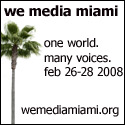 This session was, for me, the most interesting thing so far. I'm afraid the following is only some of it. The chair starts with what he calls a “party trick”: he types “power outage” into Google Search … and the first item is from the Boston Globe. Why, he asks, Boston? (Note that he used regular search, not “news” search — which, he says, is what Joe Average would do. Search, he concludes, has room for improvement. The speakers are all people working achieve that.
This session was, for me, the most interesting thing so far. I'm afraid the following is only some of it. The chair starts with what he calls a “party trick”: he types “power outage” into Google Search … and the first item is from the Boston Globe. Why, he asks, Boston? (Note that he used regular search, not “news” search — which, he says, is what Joe Average would do. Search, he concludes, has room for improvement. The speakers are all people working achieve that.
The first speaker, Mary Hodder, Founder, Dabble, gave a very good case for the use of microformats, an approach to organizing stuff that was new to me and seems, at first blush, to be really really sensible. Old-style standards approaches just don't scale to the magnitude of the task.
Fabrice Florin, Executive Director, NewsTrust, talked about trying to do better things with metadata, which might even involve metadata about metadata to provide metrics of trust and authoritativeness. It sounds hard. But it clearly sang to session chairman Jim Kennedy, VP Strategy, The Associated Press, which was an interesting datum.
Josh Cohen, Director, Business Development, Google News, talked — surprise — about the problem of scale. Classic publishers, he noted, are a tiny fraction of the content online. So a trust metric optimized for helping consumers navigate publishers may not scale for Google News, which he says now has 20 different languages and 40 different editions. Google's approach has to algorithmic, but all of these types of data could be used by an algorithm. [Although personally, I be very surprised to see Google relying on any 3rd party tags or metadata.]
Hodder notes that many people use the a Yahoo standard, Media RSS (MRSS) which they pioneered and open-sourced for tagging video content — but there are many varied (confusing) uses of it.
Kennedy asks how we tag without falling prey to the gaming of the system that killed metadata 1.0. Florin says, reasonably, make it visible to users. And attribute the source of the metadata. Hodder says, yes, but that's really hard to keep track of — how do you cross-check to find out what
Florin jokes that all we need is distinguished names (he doesn't call it that, but that's what he means). I start flashing back to the early days of digital signature discussions in the mid-90s…. Bob Jueneman, call your office …
Question from the audience suggests Everything2 is a better model – it self-polices.
(Meanwhile, in the background, it sounds as if the heavens have opened up and it's pouring. )
Hodder says she worries about relying on systems like Digg, because they are too easy to game.
Reuters person in audience asks about business models to pay for all this. Google's Cohen suggests that if replies to search are more relevant, higher quality, then they are more valuable.
Why doesn't Google announce a standard? Because it's not clear people would follow it [and, I'd add, there's the gaming issue]. Yahoo is having a meeting in two months regarding news and technology — an open-space style meeting — might that be an occasion for building out the MRSS spec to go to more news?
